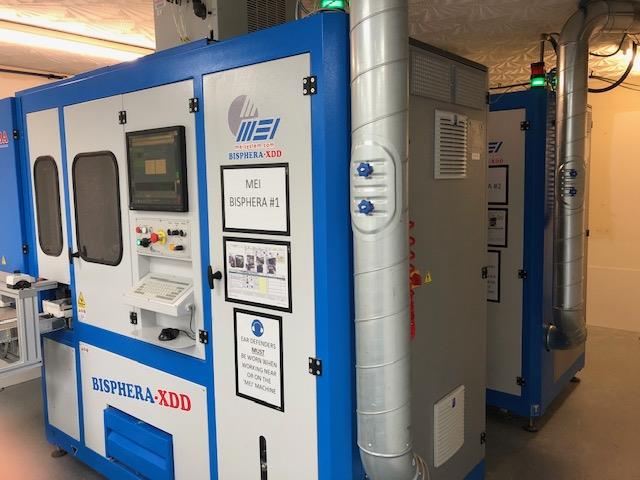
Nigel Castle is a man who intimately understands optical labs and the practices they serve. Having worked for Lenstec for more than 30 years, doing his time on the factory, he is now the managing director.
His long years of service to the company have not blunted his enthusiasm, and he recently enacted a round of investment into the site at Caerphilly that has modernised the Welsh lab.
Lenstec is actually an independent group of labs, having acquired sites in Leeds and London to expand its reach and consolidate its supply chain. The company’s largest operation is in Caerphilly where it has four sites, including one company office, one warehouse and two labs which both run for nearly 24 hours a day. It originally only had the one lab, but purchased the office, newer factory and warehouse as it grew. ‘We’re moving towards more automation at the moment, but we still have two different sides of our production. The older factory isn’t lacking in technology at all, but our newer, more automated site is now marketing leading,’ explained Castle. A £600,000 investment in the newer facility has paid for two MEI Bisphera-Xdd lens cutting machines, an extensive network of conveyor belts and lifts, and a new IT system which automates large parts of the glazing process.
Commenting on the functionality of the new glazing machines, Castle said: ‘MEI is a very high capacity Italian glazing machine that can prepare one job while cutting another, so it runs very quickly. It’s also incredibly accurate, more environmentally friendly because of dry cutting, and blockless.’ Watching the machine be fed via conveyor belt, scan the barcode of the job it was required to cut, and then complete the job quickly was impressive. Flexibility was one of the qualities that Castle emphasised most as important to the efficient flow of work for the machine. The Bisphera’s ability to cut any type of edge in any order allows Lenstec to simply order work by the date it is received, providing the quickest possible service to its customers.
Although the accuracy and automated nature of the new lens-cutting machines lowers the occurrence of mistakes, human expertise is still vital to the glazing process. Castle said: ‘Even though the investment in the machines is de-skilling the operation to some degree you still need people. From the process of fitting lenses into frames to final quality inspection the business remains very people-oriented.’ People are still responsible for feeding the conveyor belts with the right jobs in the right order and throughout the production process, employing an efficient colour-coded tray system. In the original factory site, across the road from the newer operation, teams of people still glaze lenses more manually to a high standard. Lenstec’s older factory also contains its tinting room, where lenses are tinted by hand, and its specialist sports-eyewear operation.
 Automated MEI Lines Blockless
Automated MEI Lines Blockless
Speciality
As part of a group of labs with similar capabilities, Lenstec takes special responsibility for sports-eyewear. Special computer-aided design and computer-aided manufacturing (CAD/CAM) software and hardware are employed by a team of specially trained technicians who glaze more complex lenses. Wrap-around cycling lenses with ventilation holes and ridges to fit into specially designed frames are the sort of thing handled regularly here, with the production quantity kept lower owing to the high-quality nature of the work. With typical Welsh pride, Castle showcased a red-tinted lens which had been artfully cut into the shape of a Welsh dragon and decorated with holes and ridges. ‘If we can cut these, what can’t we do? That’s what we’re meaning to ask our customers when we show them these lenses,’ he explained.
Holistic supply chain
Another aspect of the production process at Lenstec that Castle was keen to emphasise was the company’s ISO 13485 certification, which regulates medical devices: ‘We’re the only optical lab to be certified in the UK. It’s an intensive standard that audits your supply chain, risks in that supply chain, how that supply chain can affect the consumer and demands a high-level of traceability. If we send out a pair of glasses today we need to be able to say, in two years’ time, who glazed them, what shift it was on, who picked up the frame. It was a difficult thing to implement across our business, but we’re always asking how we can go above and beyond this idea of an industry standard.’
Considering supply chain, quality and service to its customers, Lenstec also recently acquired a warehouse, on the same business park as its two Caerphilly labs, alongside Pennine Optical, a frames company. Having its own warehouse where frames can be stored cuts down on delivery speeds since Lenstec is able to hold stock for some of its customers and not wait for delivery of these frames before they can be fitted with lenses. ‘We can offer bespoke solutions to small and large customers, we can hold stock on their behalf, and we can reach the market much quicker because we take out those third-party supply chains,’ commented Castle. The company also maintains its own stock of frames which it maintains an ‘always in stock’ policy on, providing customers additional peace of mind that there are always options available. A fleet of five vans also serve the labs, making use of the location’s good transport links to provide quick order turn-around to customers: ‘We can collect frames in the morning from Cardiff and deliver them back the same day if the customer needs that.’
 Lenstec’s Nigel Castle
Lenstec’s Nigel Castle
Relationships are absolutely core to how Lenstec does business; the company has maintained a family-style ethos throughout its growth and retains many of its original customers. Castle explained that each Christmas he and his sales team personally visited every customer and showed their appreciation with a case of wine and a face-to-face thank you: ‘Our relationships with all our customers are key to our company DNA, if they’re facing challenges in the high street environment or we’re having a busy period it’s much easier to work through when we have that personal relationship.’
Customer relationships are not the only valued relationships at Lenstec. The optical lab also ensures its staff feel valued through a comprehensive training scheme which requires all new staff to sign up to complete an NVQ, and regularly consults staff on working conditions with daily morning meetings where they are encouraged to share positives and negatives. For a company with just under 200 staff Lenstec employs a high number of people who have been with the company for more than 25 years and has excellent staff retention, which Castle put down to the friendly atmosphere fostered at the lab.
Working in conjunction with the other labs that are part of the Lenstec Optical group is also important, and a general sense of healthy competition is fostered between the sites which have also recently undergone major investments under Castle’s oversight.
Consolidating a supply chain through the purchase of these other labs is a move that will help to future-proof Lenstec in uncertain times for independent labs, as Castle explained: ‘People say it’s a difficult time at the moment but you have to stay ahead. There will be further challenges in our industry; the market is consolidating in the labs and on the high street, so it will be interesting to see what it looks like in 10 years and how many independent companies survive. I can’t say what it will be like, but I can try to be prepared for it.’